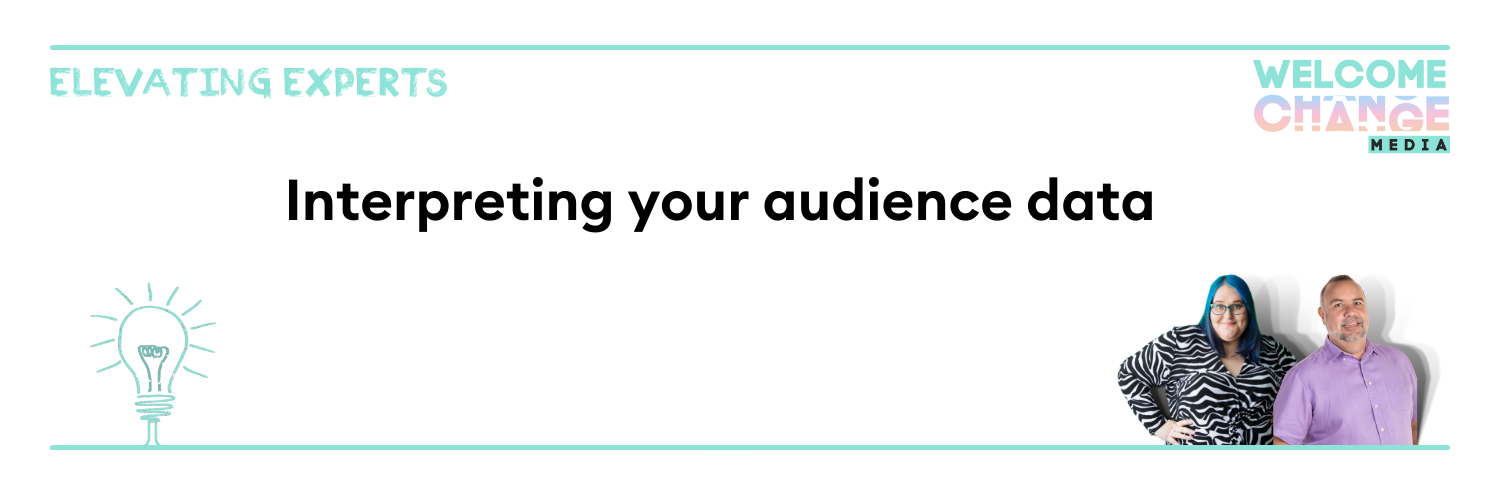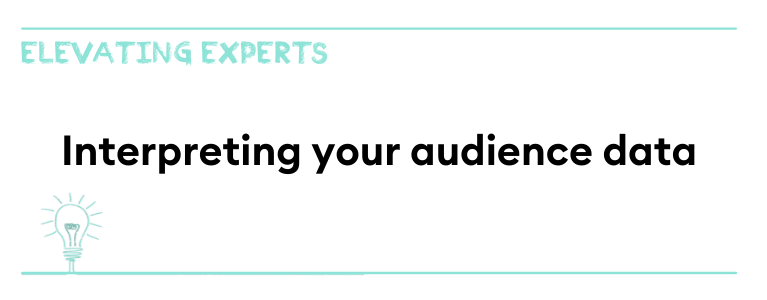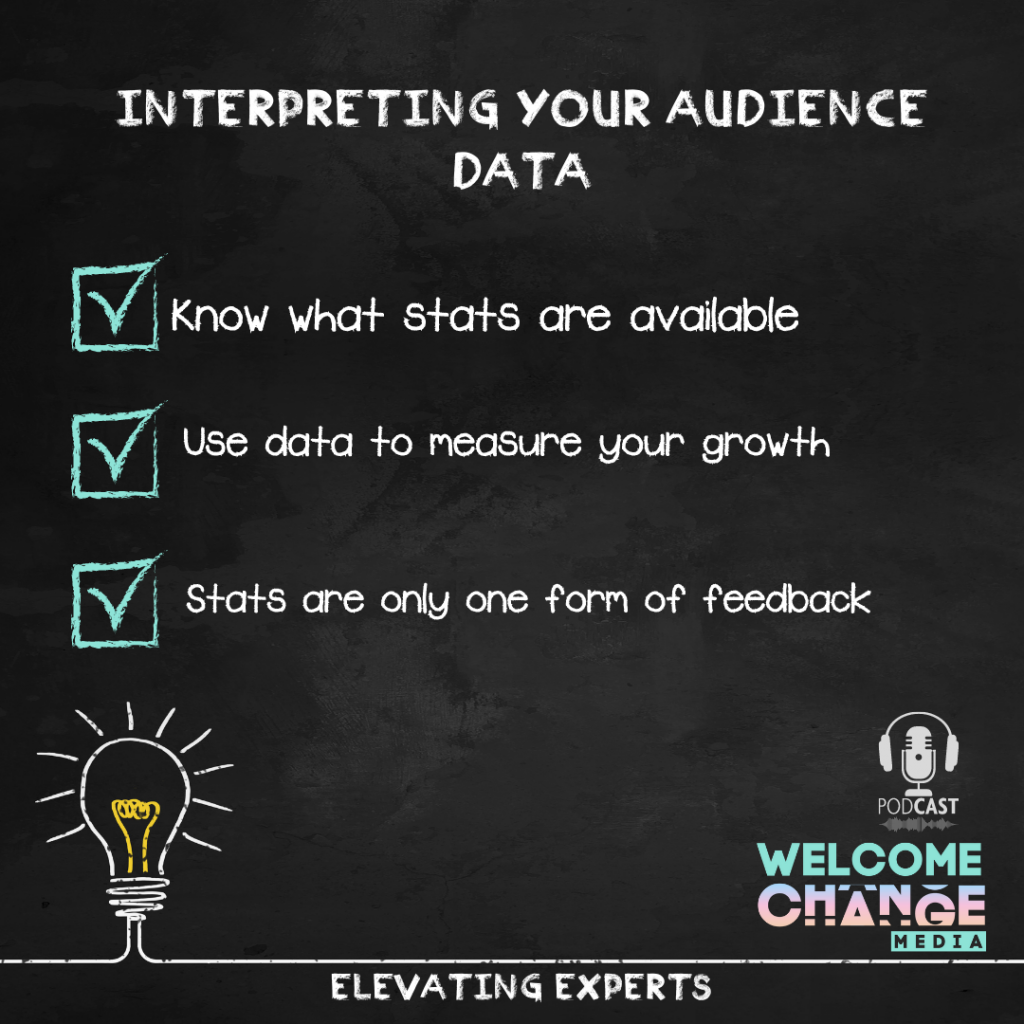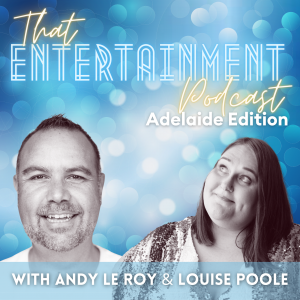

Curious about how your show is being performing?
Understanding what stats and types of feedback are available will help you make your podcast even better, and it doesn’t have to mean combing over pages and pages of data to understand it.
Listener stats are a great way to see what content is engaging your audience the most and where you should focus.
In this episode of Elevating Experts, we chat about the value in understanding your listener data.
Curious about how your show is being performing?
Understanding what stats and types of feedback are available will help you make your podcast even better, and it doesn’t have to mean combing over pages and pages of data to understand it.
Listener stats are a great way to see what content is engaging your audience the most and where you should focus.
In this episode of Elevating Experts, we chat about the value in understanding your listener data.
Listen Now!

Today's Tips!
- Know what stats are available
- Use data to measure your growth
- Stats are only one form of feedback
We’d love to hear your feedback on how this has helped you!
Send us a message and let us know how you got along:

Today's Tips!
- Know what stats are available
- Use data to measure your growth
- Stats are only one form of feedback
We’d love to hear your feedback on how this has helped you!
Send us a message and let us know how you got along:

Today's Tips!
- Write for your audience
- Write for a talker, not a reader
- Write with your other assets in mind
We’d love to hear your feedback on how this has helped you!
Send us a message and let us know how you got along:

Louise: Trying to build your audience but not sure what impact you’re having? Maybe it’s time to look at some stats. I’m Louise Poole.
Andy: And I’m Andy Le Roy, and we’re giving you the insights to help elevate you as an expert in your field.
[Elevating Experts]
Louise: It kind of sounds like one of those boring things business-people talk about all the time, but understanding the stats behind your podcast can really help you understand what’s connecting with your audience.
Andy: There’s lots of good data available out there about podcasts, and your own podcasting platform will have its own stats available which have been designed to help you get the most out of your programme. Let’s take a look at some of the ways it’s helping us.
Louise: It can be kind of stressful not actually knowing what data is out there, let alone trying to interpret it once you find it. We actually had a situation where on our particular platform, we were looking in one spot on host’s webpage for our data, but found out we should have been looking somewhere else.
Andy: Yeah, what we discovered was even though we have stats available through WordPress, the host’s website actually has a much more detailed set of data for us to look at so we can see how we’re going.
Louise: And it was a pleasant surprise to see that we actually had many more listeners than we had first thought looking in the wrong place, so hello!
Andy: Now that we know where to look for the statistics available to us, we can dig in and see exactly what they’re telling us.
Louise: At a basic level we can see how many listens we’ve had so far on any given day, and we can also see how many listens we’ve had this week compared to last week and what our growth is.
Andy: We’re really encouraged to see that Elevating Experts is currently growing at a rate of 30% per week, so it seems we’re on the right track with making content that’s useful.
Louise: This has been handy as well, because when we look at the individual episodes and how they performed, it has become obvious to us that the ones related to making and sharing content are more popular than our earlier episodes around the business start-up information.
Andy: This is not only nice for us to see, but has helped us to shape the direction of the series for the future. We decided when we saw this information, that we really were better off focusing on what we knew best.
Louise: With the added bonus that we can write from experience, rather than having to go and research things that are unfamiliar to us.
Andy: So, being able to see at a glance not only how our current listens are trending, but which episodes are more popular than others, is really helpful in being able to connect with you on things that matter most to you.
Louise: But let’s not be too hasty and fall into the trap of thinking that the stats are the only important piece of feedback.
Andy: That’s right, because although this is really useful information from a numbers point of view, there is also the feedback we see in the connections we make with people.
Louise: As much as we would love to just pop into the studio, record all the fun bits and say “job done”, promoting the episodes is really important to help make them a success.
Andy: Which is why we backup our podcast releases with social media posts and videos related to the episodes, to give it as much exposure as we possibly can.
Louise: So the other places we look for feedback is in the interactions we are getting on the different social media platforms. Whether that is a like
Andy: Or a comment about the episode on the post
Louise: Or even having a look at the number of impressions a reel on Instagram gets, for example
Andy: All of these statistics and pieces of feedback tell us how well we have done our job in making content that hits the mark.
Louise: And remember, if the statistics and feedback aren’t what you were hoping for, it’s only feedback, and you can always change something next time and do a little bit differently to see how that works instead.
Andy: And when you start to see those numbers climb, you will feel that rush of excitement, guaranteed!
Louise: But remember to pat yourself on the back whatever the feedback is, because even if it’s not what you expect, it only means you need to try something a little bit different to connect with the people who do want to hear your content.
Andy: Combing through statistics can seem pretty scary when you look at it on the surface, but they’re really just another tool to help us make things even better. Let’s just have a quick recap on what we’ve gone through today to help you get the most out of your data.
Louise: First things first, you need to know what statistics are available from your podcasting platform. Put some time aside today and have a look and see where to find the statistics your host makes available. It might be a heading called statistics, or it might be something like analytics. Either way, there will be something there that will help you to see how your podcast is performing.
Andy: Now that you’ve found where these statistics are located, use them to measure your growth. Have a look, for example, at a comparison week by week to see whether you are getting more listens this week compared to last week. You can also have a look a little bit further down into the data and see which episodes have really struck a chord with your listeners.
Louise: And remember, these numbers are only one form of feedback. The other things that you do to support your podcasts can also give you some really good feedback on how you are connecting. Those likes and comments mean that you are legitimately engaging with people and they find your podcast valuable.
Andy: And remember, if the stats don’t tell you what you want to hear, it only means that it’s an opportunity for you to try something a little bit different. You’ll be attracting those listeners in no time.
Louise: We’ve left a few links in the show notes for some popular podcasting platforms on the data they provide to help you know what to look for.
Castos listener analytics
http://Castos listener analytics https://support.castos.com/hc/en-us/articles/360019894339-How-Listener-Analytics-Work-in-Castos-
Buzzsprout listener analytics: https://www.buzzsprout.com/blog/advanced-podcast-statistics
Whooshka listener analytics: https://support.whooshkaa.com/whooshkaa-insights-analytics-dashboard-breakdown





